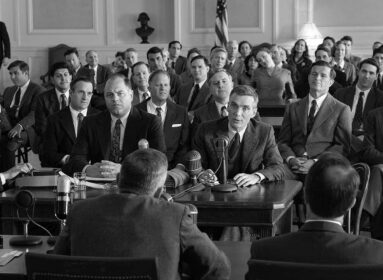
By Rafael Medoff
With all the talk of a possible third party candidate in this year’s presidential race, it’s instructive to look back at a presidential election in which a significant number of American Jews voted for the third party —and in doing so, nearly brought about the defeat of an incumbent president.
The year was 1948. Harry Truman was president, and the Republicans nominated New York governor Thomas Dewey. Former vice president Henry Wallace decided to challenge Truman from the left, running as the candidate of the Progressive Party.
In the months prior to the creation of Israel in May 1948, Truman waffled on the issue of Jewish statehood. The previous November, he had backed the United Nations plan to partition Palestine into Jewish and Arab states. But in March 1948, Truman called for an “international trusteeship” over Palestine, instead of a Jewish state.
American Jews were furious at Truman’s reversal.
A fascinating glimpse of the mood in the Jewish community may be found in a recently published collection of letters between Florence Bar-Ilan, an American Jewish woman who was living in Palestine at that time, and her parents, Samuel and Rachel Ribakove, who were back in Brooklyn.
Florence’s correspondence with her American family usually focused on personal matters, but after the trusteeship declaration, presidential politics pushed their way to the fore. “We have not been feeling very well since we have heard on the radio of the ‘Partition Betrayal’,” Samuel Ribakove began his letter of March 21. “I can hardly wait until the next election…[President Truman] will find out the temper of the Jews in the United States…”
On April 8, Ribakove again wrote his daughter about what he called “the inexcusable betrayal of the Jews” by the president. “The White House has been deluged with mail from nearly every Jew in the U.S. but that small man Truman expects to run again as president,” he wrote. “Personally I shall vote for Wallace…If Truman runs I shall take time out to ring every door bell within miles of our house and ask people to vote against him.”
With such sentiments spreading in the Jewish community, Wallace decided to make a major pitch for the Jewish vote, especially in New York State, which at that time had the largest number of electoral votes, forty-seven.
Truman’s quick recognition of the newly-established State of Israel in May was warmly applauded by American Jews, but his embargo on U.S. arms to the Jewish state outraged the Jewish community. Wallace targeted the embargo in his appeals to Jewish voters. At one rally, he accused Truman of “playing politics with the lives of the people of Israel.”
At another, he charged that “Jewish blood lies on the hands of Mr. Truman tonight.”
New York City’s newspapers soon were brimming with talk of Jewish voters dumping President Truman and supporting Wallace. The New York Times reported that “New York Democrats” were hoping Truman at least would announce a loan to Israel, and thereby “win back into the Democratic column many voters who were estranged by the State Department’s coolness to [Israel].”
The New York Star called Truman’s last-minute pre-election statements praising Israel “a direct bid for a sizable bloc of lukewarm New York City Democrats and independents. Many of the[m]…may even vote for Henry Wallace because of their dissatisfaction with Truman’s record, particularly on Palestine.”
President Truman ended up losing New York to Governor Dewey by just 60,959 votes, less than 1% of the total—and, as a result, Truman came very close to losing the national race.
In his memoirs, Truman blamed Wallace—and he was right. Wallace won 8.25%, a remarkably high figure for a third party candidate.
Where did many of Wallace’s 509,559 votes come from? My analysis of district-by-district voting records found that in the Brooklyn neighborhood of Brownsville—the most heavily-Jewish neighborhood in the country—Wallace received a remarkable 28% of the vote. In other heavily Jewish areas of Brooklyn, such as Coney Island and Boro Park, the Progressive Party nominee won from 21% to 27%. In Jewish sections of the Bronx, such as the Grand Concourse and Mosholu Parkway, Wallace won 20%-24%. The results were similar in Jewish neighborhoods of Manhattan: 28% for Wallace on the Lower East Side, 23% on the Upper West Side.
Overall, Truman received only 50-55% of Jewish votes in New York, with Wallace winning about 25% and Dewey approximately 20%. That was the lowest share of the New York Jewish vote for any Democratic candidate in modern presidential election history, except Jimmy Carter.
Most Wallace voters were, like Samuel Ribakove, former Roosevelt supporters who likely would have voted for Truman if Wallace had not been in the race. They were furious that as newborn Israel was fighting for its existence, Truman refused to give it any weapons. As longtime Democrats, most of these Jewish voters could not bring themselves to back the Republican nominee—but by taking so many traditional Democratic votes away from Truman, the Jewish vote in effect gave the state to Governor Dewey. That, in turn, brought the Republican candidate within a hair of winning the election.
Whether a significant number of Jewish voters would support a third party candidate in this year’s race is hard to say. No doubt there is dissatisfaction among some Jews with regard to both Hillary Clinton and Donald Trump, although the issues that drove Jewish voters from Truman to Wallace are not so clear-cut this time around. In any event, the 1948 contest reminds us that any time a presidential race is close in states such as New York, California, or Florida, the Jewish vote could play a significant role in determining the outcome.
Dr. Rafael Medoff is founding director of The David S. Wyman Institute for Holocaust Studies and author of 16 books about Jewish history.








 Southern New England Jewish Ledger
Southern New England Jewish Ledger









